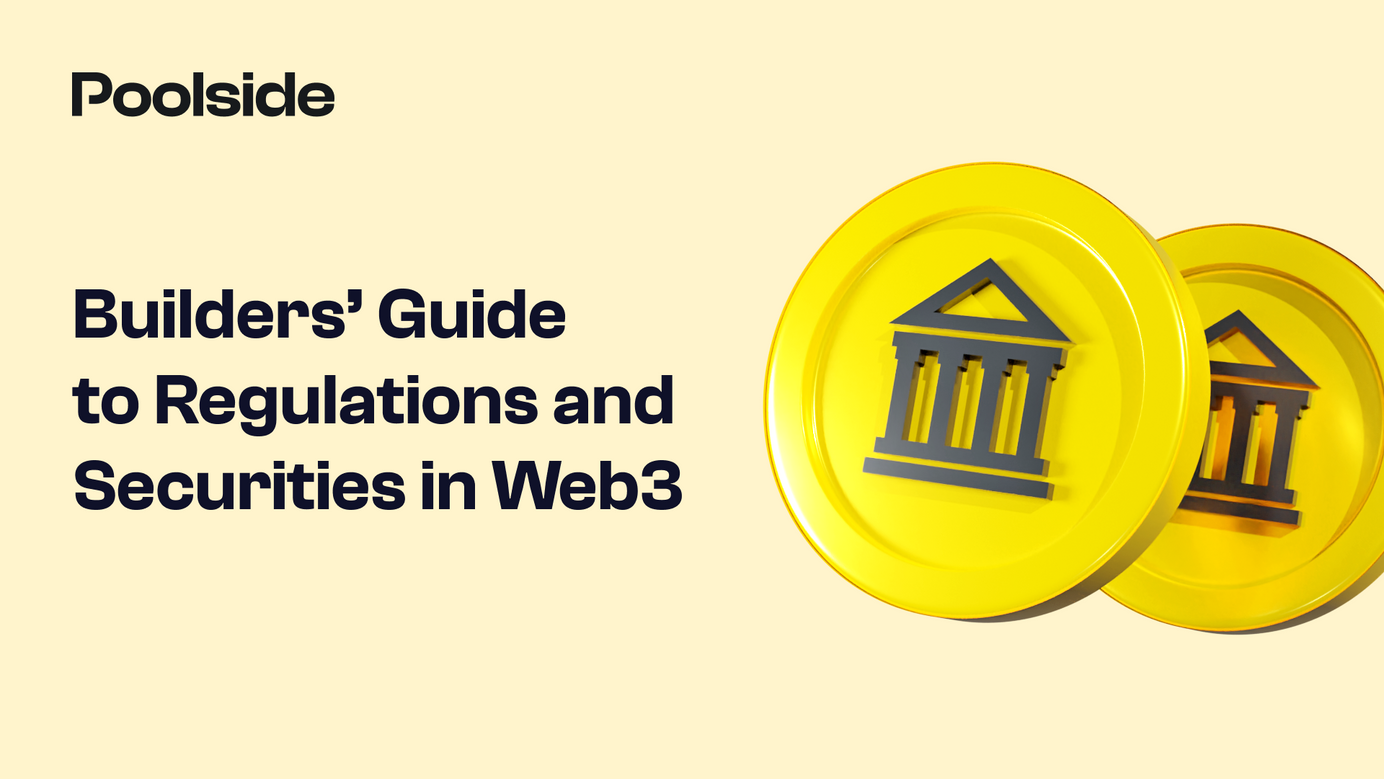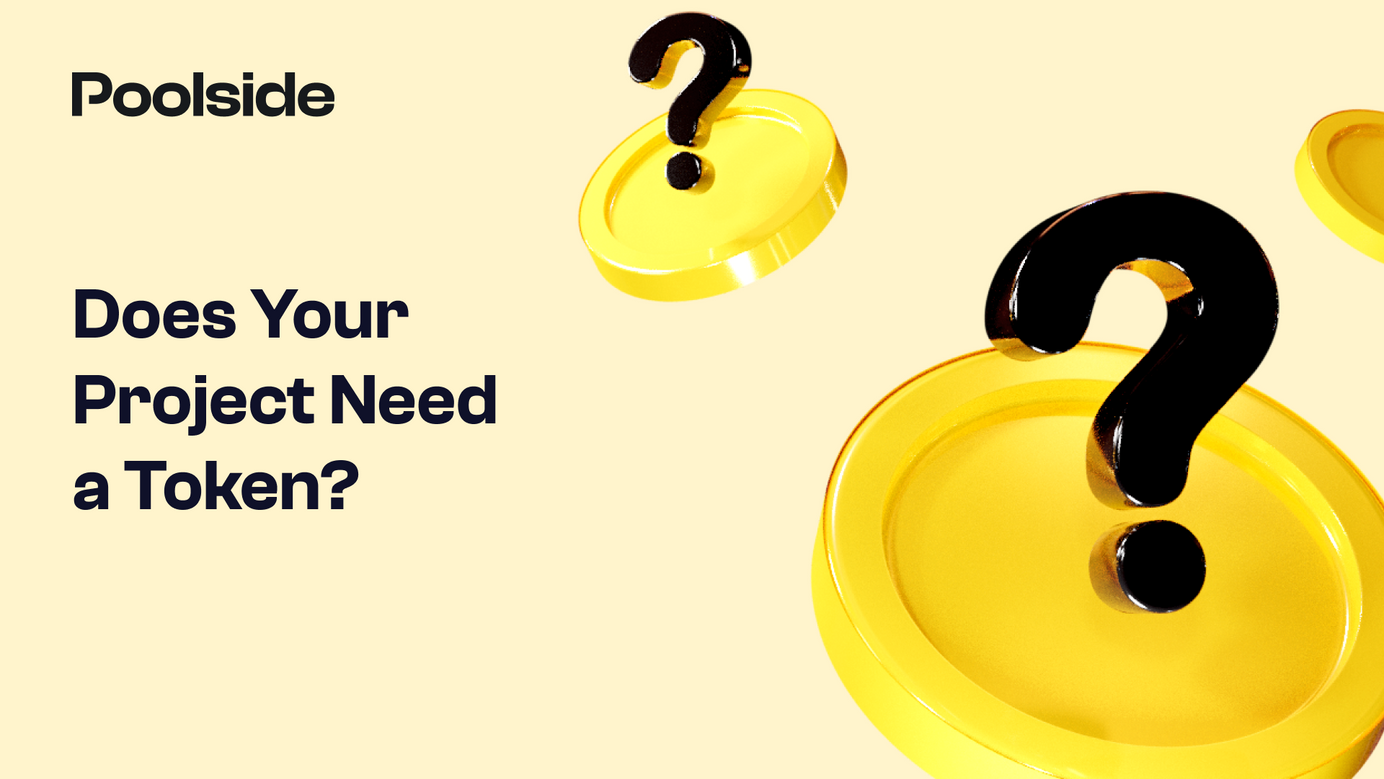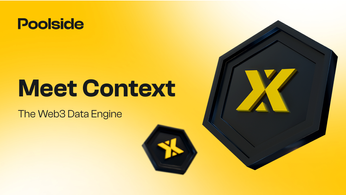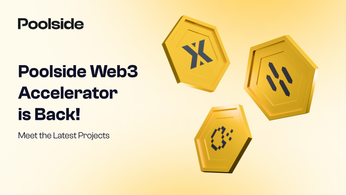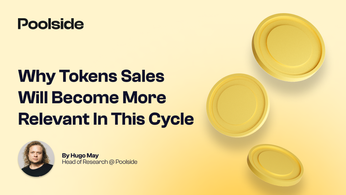
Why Tokens Sales Will Become More Relevant In This Cycle
Evaluating the past, present, and possible future ways of raising capital in web3, with a focus on venture capitalists and public sales.
By Hugo May, Head of Research @Poolside
Tl;dr
- Token offerings evolved from ‘fair launches’ (e.g. Bitcoin) promoting full decentralization to incentive-driven models steered by VCs
- Few investors participate in sales to access long-term utility; most seek quick financial gains, at the cost of project development
- Some token sale platforms offer refund features to investors, increasing project risk and decreasing overall token sale attractiveness
- Tokens are currently designed to handle high sale pressure at seed round unlock instead of being product-oriented
- Striking the balance between institutional and public capital is essential as they offer different benefits; The main advantage of public sales over VCs is the possibility of bootstrapping the community
- Token sale platforms enabling projects to raise capital while (genuinely) kickstarting their communities will likely emerge as frontrunners in the next cycle
Introduction
Launching a web3 project is challenging, and doing it without capital is nearly impossible. Considering the current capital-rich landscape, it's important to appreciate the conviction of Satoshi and other early founders who launched the first projects.
This article focuses on the web3 capital markets. It explores how they have evolved and the current difficulties these products face. In an attempt to present a solution to the challenges, we highlight the potential of community-oriented token sales in empowering decentralized ownership of public goods.
The history of web3 capital
Web3’s capital markets have gone over several phases that gradually evolved with founders increasingly able to access funding, but often at the cost of the product.
Fair launch
Initially, projects were launched without pre-allocating any tokens to the founders. This approach was very powerful in creating highly decentralized cryptoasset ownership like Bitcoin which attempted to remove the risk of any centralization of power to those willing to bootstrap the project. This period is often called the ‘fair launch’ era because of the perception that projects have to be uber-decentralized.
Pre-mine
A natural evolution of the process saw founders allocate tokens to themselves before the project went live. This approach incentivized driving value to the token through ongoing project development in return for financial benefits. While fundamentally sound, this approach pressures the market to support large early liquidations and only delivers value as the project matures, thus failing to provide sufficient working capital.
Public token sales
The third phase saw projects sell pre-allocated tokens to whoever was willing to buy them. Institutional investors and retail collectively bootstrapped projects like Ethereum, which raised $18.3m. Fundamentally, the concept is very simple: a project sells tokens with the promise they would be fundamental to the protocol in the future, creating a social form of debt between the builders and the investors. In 2017, public token sales escalated, with several projects raising substantial amounts from less-informed retail investors. Due to the lack of due diligence between the project and the investor, these empty promises led many to lose faith and their savings.
In 2019, token sale platforms solved several of the trust problems faced by retail investors. These platforms are incentivized to deliver high-quality projects to their communities, functioning as a layer of due diligence. Platforms like Binance Launchpad, Coinlist, and Polkastarter exemplify this model, having built their brands by offering access and due diligence as a service.
Professional early-stage investors
During and after the 2017 public sale frenzy, the provision of early-stage capital significantly shifted towards professional early-stage investors, or VCs, backed by contractual agreements. Projects became linked to investors through SAFTs (Simple Agreements for Future Tokens) and Token Warrants. These agreements are structured to 1) reduce investor risk arising from equity versus token nuances, and 2) enable quick and substantial value access when appropriate.
The state of web3 capital
In the absence of tangible value from public sales, VCs have become the standard, leaving retail speculators at a disadvantage. Over the past few years, most VCs have provided a stable source of capital for projects, free from the regulatory uncertainties and pressures of retail-driven markets at launch. Since becoming the de facto source of capital, VCs have played an outsized role in developing web3 projects, steering these projects towards their own incentives.
From a practical point of view, both VCs and public fundraises in current setups tend to yield similar outcomes. Both parties often harbor short-sighted and speculative views on invested tokens. Retail investors buy tokens as their only means of exposure, while VCs use tokens as an exit mechanism, preferring equity otherwise. Overall, few investors participate in sales to access long-term utility; most are motivated by quick financial gains.
Currently, the industry has more accessible capital, but from a crypto economics design perspective, this has come at the cost of comprehensive project development. This situation arises because tokens have become heavily financialized, subject to the demands of VCs, and community members now expect rewards simply for participation. This is a fundamental deviation from the principle that tokens are suitable for bootstrapping but are primarily intended to support products.
What I do care about is if billionaires make endless more PvPing (dumping) their HEAVILY DISCOUNTED insider VC coins on communities at vesting.https://t.co/Me7NkcX461
— Jordi Alexander (@gametheorizing) October 27, 2023
To support this view of the current climate, consider the typical services offered by ‘tokenomics’ consultants. Their primary deliverable has become a token issuance model designed to manage selling pressure when seed round investors gain access to their token allocations, with increasingly less effort made to develop well-thought-out, product-oriented tokens.
Projects tell VCs what they want to hear and keep the masses content.
In an attempt to stay relevant in this neglected market, some token sale platforms have started offering refunds if the sale doesn't yield short-term returns, thereby refunding investors' contributions and placing all the risk on the projects. Rather than supporting projects, this approach makes public token sales less attractive.
Distributing tokens to create a community
In crypto economic systems, tokens are distributed through two groups of approaches that differ in their objectives.
The first category, token decentralization events (TDE), generally consists of one-time events that strategically aim to decentralize token ownership. Tokens are allocated based on the resources/capital participants provide.
In the second category, on the other hand, reward mechanisms represent ongoing incentive systems based on the value of continued participation, with mining rewards being a prime example.
Focusing on TDEs, this approach includes several common mechanisms in the industry, such as airdrops, workdrops, token sales, and liquidity pool (LP) farming. We’ll save the details for another day, but fundamentally, these distribution events could be categorized based on the value received by distributing tokens:
- Financial capital (investments)
- Human capital (e.g., users or nodes)
- Access to resources (e.g., computation or liquidity)
A TDE is the first step that allows a project to become a public good to some degree, which is why token decentralization is the primary objective of this very typical go-to-market event.
Token distribution is critical in determining the distribution of power in blockchains.
— Ryan Watkins (@RyanWatkins_) May 17, 2021
Concentrated insider ownership may permanently impair projects’ ability to become credibly neutral public infrastructure.
Oligarchy is the system we’re suppose to be disrupting.
1/ pic.twitter.com/140092y1mu
Token decentralization plays a pivotal role in both TDE and the ongoing incentive approaches. It’s essential to maintain the perception of fairness and to maximize the utility attributed to the token; after all, people can’t use the token if they don’t own it.
The perception of fairness is a complex topic and often unique to this industry. The opinionated and influential nature of communities ensures equitable relationships between them and the founders, something necessary for developing long-term support. This is a feature we should be proud of.
It’s worth mentioning that not all of the blockchain projects necessarily need to have a token. We wrote about it here.
The future of public token sales
The crypto-anarchists among us may advocate for all digital public goods to be funded in public to gravitate to fully decentralized systems where everyone builds, governs, uses, and benefits.
From a pragmatic standpoint, one would rather argue for a standard where the competitive opportunities of public token sales keep VC incentives in check, and foster the growth of native VCs - the prominent community members. From experience: the Paradigms, Leminiscaps, and Placeholders of the world have been excellent community catalysts of projects.
Yesteryear's poorly regulated and speculation-driven token sales are unlikely to resurface to the same extent in their current form. Too many retail investors have been burned by unprofessional projects on questionable sales platforms (or self-conducted sales), and projects are now more cautious of legal concerns.
Token sale platforms enabling projects to raise capital while kickstarting their communities will likely emerge as frontrunners in the next cycle.
Here are the key areas that platforms should master to maintain relevance in an increasingly mature industry:
Due diligence
Platforms should offer a point of trust to both parties, serving not just as a sale mechanism but also as a safeguard. Projects expect compliant and professionally managed sales that safeguard investors from scams and unscrupulous sales tactics.
Highly regulated sales
Founders must ensure they sell tokens legally. Although some investors may dislike this cautious approach, it is crucial for us to protect our projects from regulatory issues.
Provide access to both communities
Access should be provided to both the platform’s community of recurring investors and the project’s early adopters. Both participant profiles should be assessed based on the potential value they could deliver, and access should be granted accordingly.
Incubate projects
Very few participants in the industry understand the nuances of going to market as well as token sale platforms do. Going forward, platforms should take responsibility for empowering projects in their market launch, connecting them with the right players, developing market attention, and assisting with token design.
Community building efforts
The distinction between a community member and a speculator lies in two aspects: 1) product usage, and 2) commitment agreements. Participants should contribute value to the project by engaging in meaningful work (quests) that benefit the project and signal commitment through vesting periods. There exists a significant opportunity to innovate sales mechanisms e.g. a Dutch auction model focused on vesting schedules, rather than solely on price.
Conclusion
Raising capital is crucial in getting any project on its feet, but it can develop misalignment between project goals and capital providers. In 2023, financial capital is far more accessible and the industry has come to accept that developers should be incentivized to do their best and deliver on the vision.
Striking the balance between institutional and public capital is essential as they offer different benefits.
Institutional capital is reliable but pressures the token, and thus the product, to benefit their liquidity events. Public token sale platforms in their current designs create speculators who often don’t become supporting community members.
If done right, selling tokens to retail presents additional benefits ranging from zero-cost marketing to building a community of users that support the project, which is very difficult to compete with VCs. Still, no VC can deliver the value that the LINK marines do for Chainlink.
The downside of involving retail investors is that their support is often tied to token performance in the short run, so we have to design crypto economic incentives and sales that support the long-term growth of networks, protocols, and applications.
About Poolside
Poolside is an ecosystem designed exclusively for web3 builders. With its suite of services and expert resources, Poolside helps web3 projects make a splash in the rapidly evolving world of web3. In addition to being a physical hub at the heart of the web3 district in Lisbon, Poolside also hosts a remote accelerator program that takes selected projects from ideation to market launch, while providing initial funding of up to $100,000. The Poolside ecosystem is rapidly expanding with key partners and a growing community of web3 builders, mentors, and investors.
Poolside Lisbon Hub | Web3 Accelerator | Podcast
Poolside Newsletter
Join the newsletter to receive the latest updates in your inbox.


